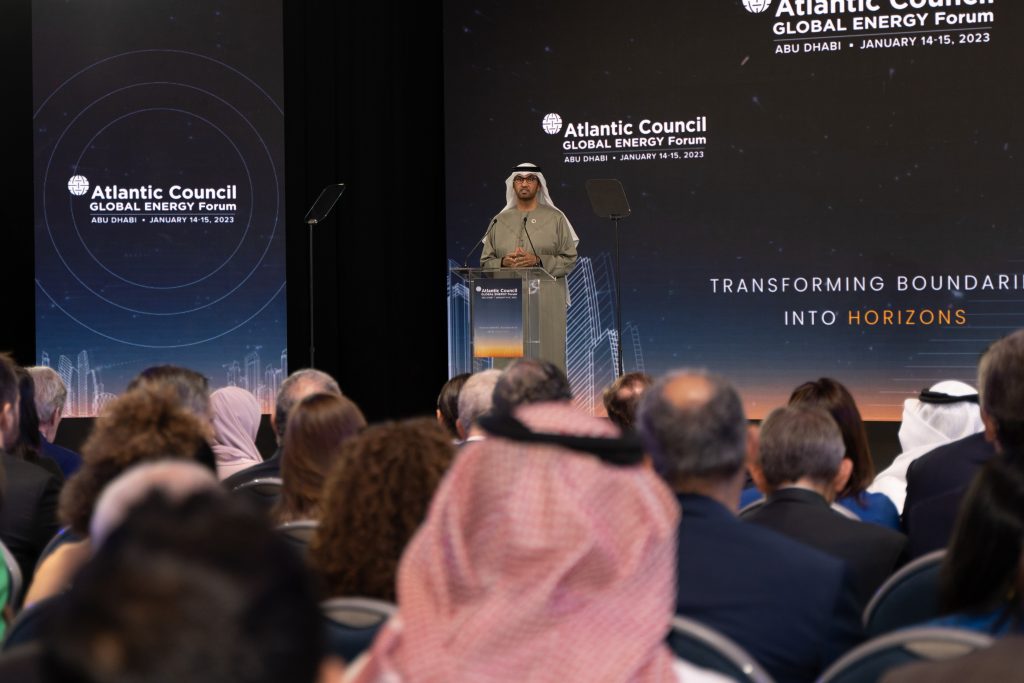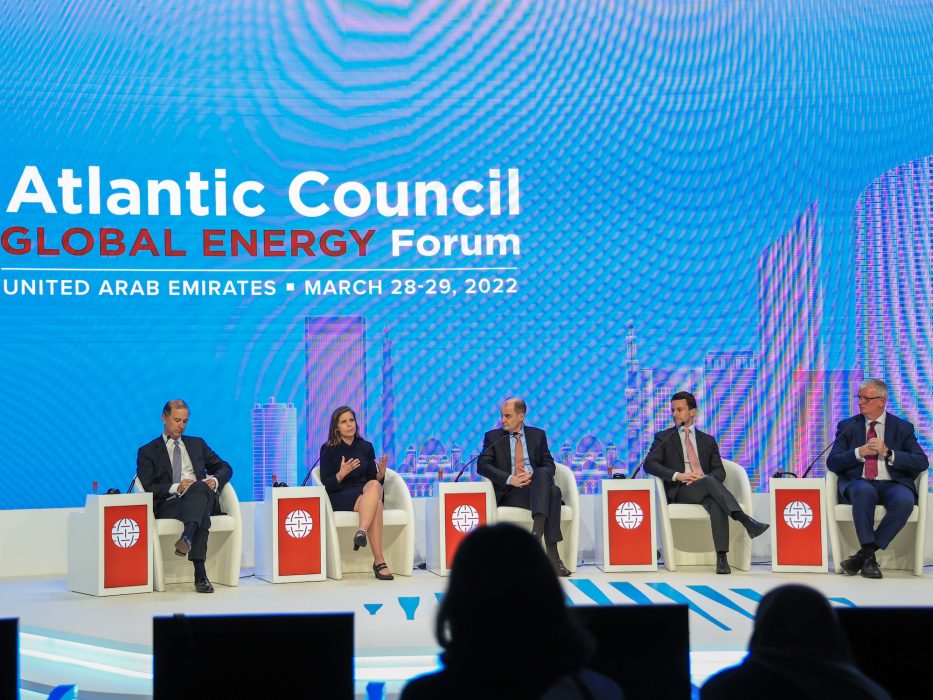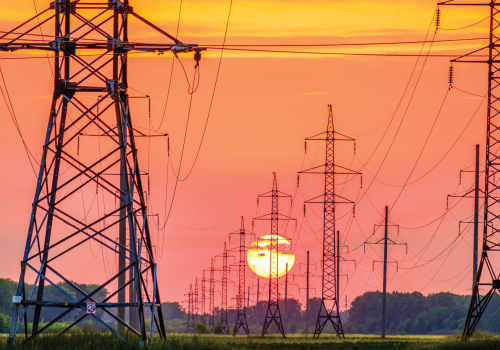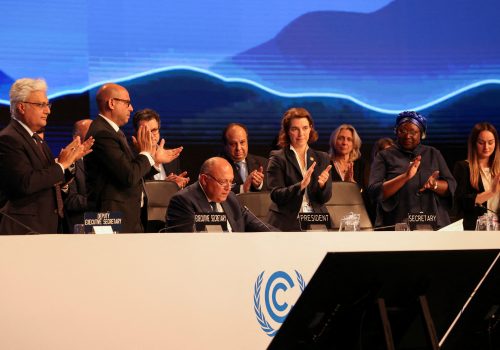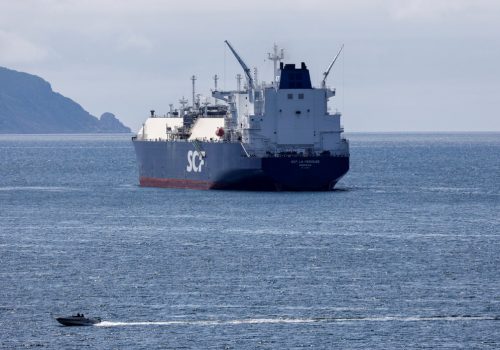On January 14, 2023 at the Atlantic Council’s Global Energy Forum, H.E. Dr. Sultan Al Jaber, UAE minister of industry and advanced technology and special envoy for climate change, called for a transformational shift in the race to combat the climate crisis. Below are his remarks as delivered at the forum, which took place just days after Al Jaber was designated the COP28 president.
Watch the full event
Good morning. Your excellencies, distinguished guests, ladies and gentlemen, dear friends, welcome to the United Arab Emirates, to Abu Dhabi, and to the seventh Atlantic Council Global Energy Forum.
And thank you, Fred, for your kind introduction. Thank you for your leadership, for your partnership, and for making sure that we always have the right mix of expertise participating in this very important forum.
And as the opening event of Abu Dhabi Sustainability Week, this forum helps set the energy agenda for the year ahead. And as the UAE prepares to host COP28, the Emirates Climate Conference this year carries a very special significance.
The UAE approaches this task with humility, a clear sense of responsibility, and a great sense of urgency. Like all countries around the world, the UAE is exposed to the risks of climate change. We have always considered environmental stewardship as an integral part of our economy and view climate action as central to the successful development of our nation.
We are proud to be the host country of the International Renewable Energy Agency, IRENA; the first country in our region to commit to the Paris agreement; the first in the region to submit a nationally determined contribution; and the first to set out a roadmap to net zero. And we will continue to focus on this very important journey.
More than eighteen years ago, His Highness Sheikh Mohamed bin Zayed Al Nahyan, the president of the United Arab Emirates, had a long-term vision of the future, and he took a bold step when he decided to establish Masdar. This was our first major practical, proactive move into the energy transition. Under His Highness’ guidance, Masdar has grown to become one of the largest renewable energy investors in the world and is aiming for a hundred-gigawatt portfolio by 2030.
Over the last fifteen years, the UAE has invested a total of fifty billion US dollars in renewable energy and clean tech globally and plans to invest another fifty billion US dollars in the years ahead. And beyond investing in new energies, it was His Highness who said there will be a time when we load the last barrel of oil. And he continued: If our plans are the investments today are right, it will be a moment of celebration.
This call to action by His Highness at the World Government Summit in 2015 clearly underscored his vision for sustainable development delivered by economic diversification and enabled by a rapid transition of our energy systems. And today, over 70 percent of our economy is generated outside the oil and gas sector. And as the founding CEO and chairman of Masdar, and the MD and CEO of ADNOC, I will continue to follow our leadership’s vision and guidance in making today’s energy cleaner while advancing and continuing to invest in the clean energies of tomorrow.
And we will use our experience, our ambition, and deep and rich network of partnerships to inform our approach to COP28. During the course of the year ahead, we will work very closely with COP27 Egyptian presidency, the UNFCCC Secretariat, and of course all relevant parties to build on and accelerate progress made before us.
Yet, we must be honest with ourselves about how much progress we have actually achieved, and how much further and faster we truly need to go. Of course, we have collectively achieved major milestones along our journey. In Glasgow, 90 percent of the world’s economies committed to net zero by 2050. Sharm El Sheikh elevated the voices of the Global South, put loss and damage firmly on the agenda, and started to address reforming the climate finance system. COP28 will have particular significance, as it will mark the first global stock-take, a comprehensive assessment of progress against the goals of the Paris agreement.
And we don’t need to wait for the stock-take to know what it will actually say. We are way off track. We are way off track. The world is playing catch-up when it comes to the key Paris goal of holding global temperatures down to 1.5 degrees, and the hard reality is that in order to achieve this goal global emissions must fall 43 percent by 2030. To add to that challenge, we must decrease emissions at a time of continued economic uncertainty, heightened geopolitical tensions, and increasing pressure on energy security.
Ladies and gentlemen, there is no other way to really address our climate challenge. We need to make transformational progress. And for that to happen, we must be prepared. We must be prepared to transform the process with the support of all parties and stakeholders.
We want COP28 to transform systems and accelerate 2030 trajectories through game-changing partnerships, game-changing solutions, and real tangible outcomes. We want it to be a COP of solidarity that bridges Global North and South and includes public and private sectors, scientists and civil society, women, and youth. And we want it to be a practical COP, a COP of action, a COP for all, a COP that raises ambition and moves from goals to actually getting it done across mitigation, adaptation, loss and damage, and, of course, finance.
Allow me to elaborate on those points one by one. On mitigation, we know that many of the—we know many of the solutions do exist: scaling renewables and nuclear and hydrogen and carbon capture and energy efficiency and, of course, the least carbon-intensive oil and gas as well as new technologies yet to be developed and deployed.
Wind and solar added record growth of 550 gigawatts between 2020 and 2022 and are on course to grow more over the next five years than over the last twenty combined. The market is actually telling us something here. The market is telling us something. We are at a turning point in history.
Low-carbon growth is the future, but we must get there much faster. We must triple renewable energy generation from eight to twenty-three terawatt hours by 2030. We must more than double low-carbon hydrogen production to at least 180 million tons for hard-to-abate sectors. We also need to transform our food and our agriculture systems because we know that agriculture accounts for one-third of global emissions.
Much greater investment in agri-tech, smarter water use, and food production is needed to transform this critical sector, alongside many other sectors, and we need to do all this in an accelerated time frame. Again, it’s a fast-approaching deadline.
Let me just add this. Our world is on its way to being home to 9.7 billion people by 2050 and will have to produce 30 percent more energy than what is available today. We, and as long as the world still uses hydrocarbons, we must ensure they are the least carbon intensive possible.
We will work with the energy industry on accelerating the decarbonization, reducing methane, and expanding hydrogen. Let’s keep our focus on holding back emissions, not progress.
On adaptation, the number-one priority is very clear. We must do more to protect our most vulnerable communities and our most critical systems from extreme weather and biodiversity loss.
We must protect our rain forests and invest in nature-based solutions like mangroves that act as powerful carbon sinks while protecting coastlines and preserving natural ecosystems.
We must ensure that our global food system is resilient to the changing weather patterns that threaten farmers around the world, and to enable this progress we must double adaptation finance for the Global South to forty billion dollars annually by 2025.
On climate finance, we simply need more. We need it to be more affordable. We need it to be much more accessible. We need to ensure that every concessional dollar is matched by two or three dollars of private capital.
To make this happen, we need to answer the call from the international community for inclusive reform of the multilateral development banks and international financial institutions. In fact, that is a critical success factor. And to encourage this process the UAE, as chair of the World Bank-IMF Development Committee, intends to play a proactive, supportive, and facilitating role.
And on loss and damage, we need to help the most vulnerable to rebuild after climate-related disasters. Together with the international community, we must build on the progress made in Sharm El Sheikh and fully operationalize the loss-and-damage fund.
Distinguished delegates, dear friends, as an ambitious young nation that continues to evolve, the UAE has grown through partnerships, opened up to new ideas, and learned many, many lessons along the way. We don’t claim to have all the answers, but we believe we have something valuable that we can contribute. At the crossroads of north and south, east and west, we will listen. We will engage with all those who wants to engage. We will listen and we will engage with those who want to engage. We will build bridges and we will pursue global consensus in this very important collective effort.
Together with the high-level champion Her Excellency Razan Mubarak and the youth champion Her Excellency Shamma Mazrui, we will work very closely with the UNFCCC to move from ambition to real action. And we will mobilize the private sector and all other sectors to deliver greater, more meaningful impact.
So let me extend an open invitation to all parties across government, private sector, and civil society: cooperate, collaborate, share your ideas, and talk to us. I am here to listen, and I am here to engage. We can only succeed if we have an open and constructive dialogue. Let us together create a paradigm shift for tangible progress. And let us remember that reaching net-zero emissions will deliver the biggest market transformation with the greatest economic and human promise since the first industrial revolution.
I urge all parties to help make COP28 a COP of concrete outcomes and practical solutions. We are united by our common goal. We are united by our common humanity. And we look forward to hosting you all in the United Arab Emirates, where together we can ensure sustainable development for this generation and all generations to come. Thank you.
Watch the full speech
Further reading
Fri, Jan 13, 2023
The 2023 Global Energy Agenda
Global Energy Agenda By
The third edition of the Global Energy Agenda provides context for the year that has passed. It features a survey of thought leaders in the energy sector, as well as a series of essays by the leading figures in energy, to set the energy agenda for 2023.
Mon, Nov 21, 2022
The big success and bigger failure of COP27
Fast Thinking By
What other surprises cropped up at the conference? Our experts, who were on the ground in Sharm el Sheikh, are here to weigh in.
Thu, Dec 8, 2022
Securing alternative gas supplies and addressing critical infrastructure gaps in Europe
Issue Brief By Richard L. Morningstar, András Simonyi, Olga Khakova, Paddy Ryan
This issue brief offers recommendations for measures that European countries decoupling their energy supplies from Russia should take to give themselves the best chances of succeeding.
